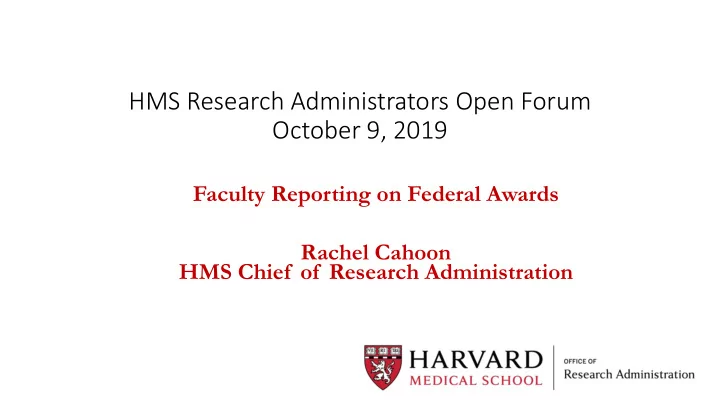

HMS Research Administrators Open Forum October 9, 2019 Faculty Reporting on Federal Awards Rachel Cahoon HMS Chief of Research Administration
Federal Reporting Requirements Reminders of NIH Policies on Other Support and on Policies related to Financial Conflicts of Interest and Foreign Components (NOT-OD-19-114) Other Support Foreign Components Financial Conflict of Interest (FCOI)
Introduction International collaborations are increasing and are critical for addressing global issues. Scientists and institutions recognize the value of international collaborations. The U.S., and other countries, have identified potential risks associated with international research that require mitigation. Most funding agencies are asking for greater focus on the integrity of research and protection of IP generated from the research.
NIH has asked for information relating to specific faculty in a number of institutions regarding their non-disclosure, or incomplete disclosures including: Financial conflicts of interest, including travel support Other support Foreign affiliations Foreign grants or labs in foreign countries Funding from the Chinese Talents Program Foreign Component Failure to completely disclose affiliations, or research agreements, with the foreign companies Note: NSF announced at the Sept FDP meeting that they will hold off on making changes to the PAPPG until they gather more information and input .
Why is this important? Integrity of Peer Review Process : Sharing of confidential information on grant applications by NIH peer reviewers with others, including foreign entities, or otherwise attempting to influence funding decisions; and Failure to Fully Disclose Information : Failure by some researchers to fully disclose substantial resources from other organizations, including foreign governments, financial conflicts of interest; appointments at foreign institutions, etc. in their grant proposals or institutionally required disclosures. Compliance with Regulatory Requirements : U.S. Export Control laws and regulations establish a set of requirements for transfer of technology and data to foreign countries and/or foreign national in the U.S., in addition sanctions from the Office of Foreign Assets Control (OFAC) restrict interactions with individuals or entities on the sanctions list. Loss of Intellectual Property (IP) : There have been a number of reported instances of unauthorized removal of data from research laboratories resulting in loss of intellectual property including publication of the inappropriately obtained data before U.S. scientists.
Foreign Com ponents “NIH has not changed the definition of a foreign component. NOT-OD-19-114 reminds recipients that a foreign component is the performance of a significant scientific element of the NIH-supported project outside of the United States. Once a recipient determines that a portion of the project will be conducted outside of the U.S., the recipient then will need to determine if the activities are considered significant. If both criteria are met, then there is a foreign component.” “The recipient institution should evaluate the element of the project that is being conducted outside of the United States within the context of the project as a whole when making determinations about significance. Some examples of activities that may be considered a significant element of the project include, but are not limited to: - collaborations with investigators at a foreign site anticipated to result in co-authorship - use of facilities or instrumentation at a foreign site - receipt of financial support or resources from a foreign entity.”
Now what? What can I do? Action and vigilance by institutions could mitigate the potential risks by simple actions such as: Raising awareness of the faculty and reminding them of their requirements. Establishing a review process for ensuring full disclosure. Establishing a monitoring program to periodically monitor higher-risk portfolios. Perform outreach and develop training for research administrators Work collectively to connect the dots Make sure our faculty, researchers, students, post-docs, and staff know they are supported!
Who can I go to if I have questions? OFFICE FOR RESEARCH ADMINISTRATION Rachel Cahoon, Chief Research Administration Officer Rachel_Cahoon@hms.Harvard.edu 617/432-0050
Recommend
More recommend